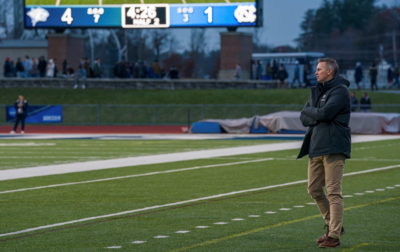12/15/2021
Coach’s Corner: Marc Hubbard - UNH Men's Soccer Coach
Marc Hubbard grew up in the shadow of Wildcat Stadium in Durham, NH, attending Oyster River High School where he led the Bobcats to consecutive Class I State Championships. Marc went on to attend Colgate University before he ended up back in the granite state playing professionally for the NH Phantoms of the USL. While very successful as a player, Marc’s coaching success truly bears mentioning.

Coach Hubbard cut his teeth early as an assistant at UNH before moving on to Southern New Hampshire University. While there, his efforts culminated in a National Championship in 2013. His tenure was flush with league championships, tournament appearances and coaching awards.
Marc has been the UNH Men’s Soccer Coach for the past six years amassing a record of 70-23-14, highlighted by a dominant 34-1-5 record at Wildcat Stadium. Now in his seventh year, the Wildcats put in a tremendous season, going 17-2-2 including an emphatic, 4-1, signature win against the University of North Carolina in Durham. The team would go on to battle the number one team in the country, Oregon State to a 1-0 loss in Corvallis, Oregon in the NCAA tournament.
Under Marc’s leadership, UNH has grown tremendously as a program, amassing at least 10 wins every season he’s been at the helm. His teams have been league tournament champions in 2018, 2019, and 2020 and they’ve now made an NCAA tournament appearance for the past five straight years. Marc and his staff have been recognized for their excellence numerous times over the past several years with Marc wining the ECAC Coach of the Year in 2019.
Coach Hubbard has shared his thoughts on the recruitment process and how to find a good fit for your college playing career.
What advice would you have for a high school soccer player looking to play in college?
First, visit as many local programs as you can, even if you have no desire to attend that school. Ask yourself, what’s important to you outside of sports? What size school will best suit you? Visiting a variety of schools will allow you to explore different types of housing, find out more about the major you’re interested in, determine how the dining hall experience looks and figure out if a city or country setting best for you. Gathering this information on local trips will save time and help narrow your search.
Second, consider fit. To avoid transferring, find the programs strengths and weaknesses and see how they mesh with what’s important to you. Do a realistic assessment of yourself and ask perspective coaches how much playing time you might expect. Visit local games to see how your style of play or ability would blend with that team. Ask, would you rather play consistently at a Division 3 school or do you hold out to play at a higher level with less chance to see the field?
Next, try to attend local soccer clinics held by the schools during your sophomore and junior years. This will give you direct exposure to the schools coaching staff and will allow for feedback and relationship building.
Once an athlete finds a school they’re interested in, what would be the next steps with the soccer program?
Direct inquiries to the coaching staff work best. Ensure that the athlete (not the parents) own the process. Coaches appreciate that the prospect is responsible for their own actions. Write an email that includes academic information (we’re going to find out anyway...), their high school resume, a 3–5-minute highlight video and references to call that includes high school and club coaches.
Each athlete is allowed 5 official visits to different schools. Most schools will cover the expenses if they have an interest in bringing in the athlete. Athletes can check out schools at any age, but coaches are not allowed to respond until after the student’s sophomore year.
How is this handled through the NCAA and Admissions?
The NCAA has a clearing house for D1 and D2 athletes that will determine academic eligibility and ensure amateur status. Admissions will look for the GPA, high school transcripts and major preference. Every school is different, but they will weigh their standardized tests scores with how they performed in their core courses. Generally, if they have higher test scores, their core courses can be a little lower and vice versa. At this point Admissions gets in touch and will walk applicants through the process.
Any final thoughts?
Do your homework! There is much to be learned about the program and coach, the league they play in, how much they travel, what academic qualifications are needed, and what type of players have they’ve recruited in the past. Don’t be afraid to ask lots of questions.
And lastly, visit as many schools as possible. This will allow you to compare and contrast programs and determine what’s the best fit for you.
Thank you Coach Hubbard, we appreciate your feedback and congrats on another amazing season!